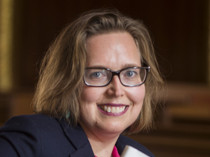
Sociologist Elaine Howard Ecklund’s research finds myth-busting levels of accord between scientists and evangelicals. Photo by Jeff Fitlow courtesy of Rice University.
WASHINGTON (RNS) The sociologist who busted myths last year with her study finding that the majority of scientists are religious, not God-denying atheists, is at it again.
Elaine Howard Ecklund, director of Rice University’s Religion and Public Life Program, said 70 percent of self-identified evangelicals “do not view religion and science as being in conflict.”
Now, the myth that bites the data dust, may be the one that proclaims evangelicals are a monolithic group opposed to the scientific view of human evolution.
Ecklund addressed 200 scientists, pastors and others at an American Association for the Advancement of Science’s event Friday (March 13).
Last year, at an AAAS’s Dialogue on Science, Ethics and Religion, Ecklund presented the first wave of data that examined the beliefs of self-identified scientists. It was drawn from a survey of 10,000 U.S. adults that claims to be the largest study of American views on these issues.
The headline then was that 76 percent of scientists in the general population identify with a religious tradition.
This year, the news from the second wave of data in the study was the high degree of science acceptance among evangelicals. The study found:
- 48 percent view science and religion as complementary. Astrophysicist and evangelical Christian Deborah Haarsma, president of BioLogos, which recognizes “God as Creator of all life over billions of years,” said what she sees in the cosmos is “a scientific description of the universe God created.”
- 21 percent view the two worldviews as entirely independent of one another.
- About 30 percent see these worldviews in opposition.
Overall, 85 percent of Americans and 84 percent of evangelicals say modern science is doing good in the world. The greatest areas of accord were on the pragmatic side of science such as technology and medical discoveries that can alleviate suffering. Here, said Ecklund, most Americans see science and faith collaborating for the common good.
However, Ecklund also noted a finding that may make the evidence-based science world uneasy: 60 percent of evangelicals said scientists “should be open to considering miracles in their theories.”
The Perceptions Project had held workshops with Catholics, mainline Protestants, and with other religious communities but the focus has been on evangelical churches and seminaries. Galen Carey, vice president for government relations for the National Association of Evangelicals, is advising AAAS on the Perceptions Project.
Rather than drawing hard lines between spiritual and scientific understandings of reality, more than one speaker at the event repeated Augustine’s view that, “All truth is God’s truth.”
Dorothy Chapell, dean of natural and social sciences and professor of biology at Wheaton College in Illinois, said this means all can “confidently study both the truths of faith and the truths of science.”
Former U.S. Rep. Rush Holt Jr., the recently named CEO of AAAS, added that all who profess to have open minds to truth have “an obligation to listen to each other.”
YS/AMB END GROSSMAN




